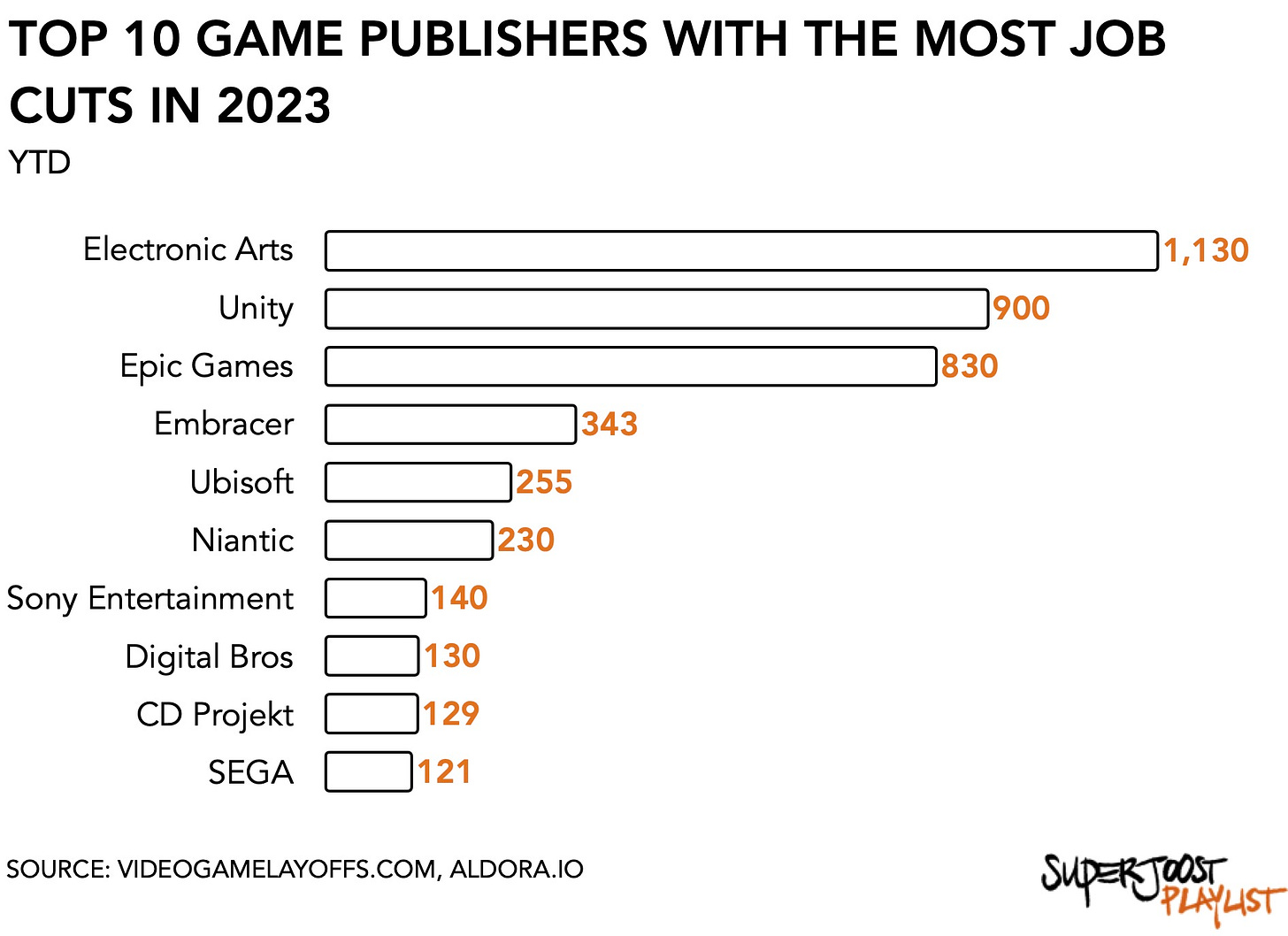Best layoffs of the year
Widespread job cuts in pursuit of short-term profits undermine innovation, diversity, and new talent pipelines vital to pushing creative boundaries
The SuperJoost Playlist is a weekly take on gaming, tech, and entertainment by business professor and author, Joost van Dreunen.
When I visited the Las Vegas strip a few weeks ago, my cab driver assured me the detour would be worth it.
Sin City was in the final stages of preparing to host the Las Vegas Grand Prix. Following a rough few years that included a complete shutdown during the pandemic and a cyberattack that cost some hotels up to $100 million, the racing event is the tip of the spear toward rejuvenation. Even so, the economics of entertainment have shifted.
After hosting two prior F1 events in the early 1980s in the Caesars Palace parking lot, the 2023 budget and expectations are much higher. Liberty Media, an $8.7 billion a year media firm, spent “$600 million to develop for a 10-year race deal.”
One justification is the F1’s appeal to younger audiences. In the United States, 12 percent of people between 18 and 34 years old consider themselves ‘avid’ fans. For those aged 35 to 44, that share is 16 percent. It springs hope as other, more conventional sports wrestle with an aging fanbase. Similar to Inter Miami CF’s hiring of soccer GOAT, Lionel Messi, a massive investment in high-end racing is hoped to bring eyeballs to the pitch.
Liberty Media’s CEO, Greg Maffei, is optimistic.
“I think Vegas will like this a lot. It will be the largest sporting event ever done in Vegas. Bigger than the Super Bowl, bigger than anything they have ever had, and we're seeing injecting something like $1.2 billion in the local economy.”
Maffei sounds like a showman hyping his latest production with little regard for data, math, or reality. According to an independent study conducted by the L. William Seidman Research Institute at W.P. Carey School of Business, Arizona State University, the 2023 Super Bowl LVII hosted in Arizona brought in $1.3 billion.
I digress.
Self-serving corporate interests fuel the race. Instead of positioning Formula 1 to appeal to a mainstream crowd, it is hopelessly targeting the big spenders. Tickets ran between $500 and $2,000 each, and for last weekend’s kick-off hotels like the Wynn offered packages ranging from $50,000 to $1 million that included unlimited champagne and caviar.
But the most vexing was the white tape.
A small ‘security’ army had been blocking the views from the many walkways and sky bridges between hotels with swats of white tape to ensure people buy tickets instead. The barricades are not for safety as much as they are to squeeze out a profit.
As a consequence, the F1 launch was little more than a drab event that did not just leave the fans skeptical. Max Verstappen, three-time world champion, proved similarly unimpressed. In typical Dutch candor, he finds the Vegas track “boring” and criticized the emphasis on spectacle over sports.
“We are just standing up there, looking like a clown. [It’s] 99% show and 1% sporting event.”
Sure enough, a race can involve extra twists and turns to accommodate its sponsors. But I’m unsure the detour in Vegas is worth it.
On to this week’s update.
BIG READ: Best layoffs of the year
The games industry is doing better than it’s ever done. It is also cutting costs and laying off staff at an alarming rate. According to videogamelayoffs.com, a site that tracks public announcements across the industry, a reported total of 8,000 people have lost their jobs in gaming in 2023.
Reducing headcount is a tactic that goes over well with investors. Generally speaking, a cost reduction improves a firm’s profitability and with it its share price. Embracer, for example, regained favor from investors last week. Its share price jumped +11 percent after it reported better-than-expected operating profits in its second-quarter earnings. The Swedish games conglomerate is in the midst of a bloody restructuring and has been culling its personnel expenses. Similarly, Amazon Game Studio announced the termination of 180 jobs. And Digital Bros and Kongregate also joined the “wave of video game industry layoffs.”
Overhead is generally the largest expense on the books of any development outfit or publisher. Reducing headcount is by far the easiest way to reduce costs and return to something resembling profitability.
However, because building up human capital is costly and slow, making cuts following a rushed acquisition is destructive. Better than, perhaps, to look for alternatives elsewhere first.
One way would be to postpone pricey acquisitions to avoid creating financial vulnerabilities. After SEGA completed its $776 million acquisition of Rovio in August it is now allegedly threatening with mass layoffs in response to unionization.
Another is to reach out to your largest vendors and service providers (e.g., engine software providers, payment facilitators, platform holders) and renegotiate the terms of your most expensive contracts. During Embracer’s annual meeting, its CEO Lars Wingefors blamed the growing power of platforms:
“In reality, we are paying more fees to platforms than we spend on games development every year.”
Whatever the justification, the long-term impact of layoffs is two-fold.
First, reduces on-ramps even further. Unlike the film and music industry, there remains a dire absence of ways for young talent to enter the games industry. After completing a game design course, there simply isn’t an active effort among publishers to go and recruit people. From my vantage point, there are plenty of recruiters from a variety of industries crowding the NYU campus to bring new blood to their organizations every year. Game companies remain mostly absent, despite New York’s growing prominence as a hub for investment and creativity in interactive entertainment.
It further exacerbates the circumstances of those people whose presence is desperately needed (e.g., women, and people of color). It reduces the already paltry diversity at the core of the games industry and neutralizes the talent heterogeneity that tends to lead to breakout successes.
Second, it presents an onslaught of mediocrity.
The increased risk profile of interactive entertainment, especially against a background of rising platform fees and marketing expenses, pushes innovative new content to the back burner. Parent organizations tend to forfeit the potential of innovative novelties in favor of their subsidiaries’ proven franchises, shelving such projects in a freezer somewhere, never to be thawed.
It also pushes innovation to the bottom half of the industry’s supply side, forcing smaller firms with less access to capital to take on more risk to compete. That makes them vulnerable and can result in a disproportional impact when forced to let people go.
For instance, so far French publisher Ubisoft has reported a total of 255 layoffs in 2023, which represents 1.3 percent of its global workforce of 19,409. Niantic, by comparison, cut a similar number of jobs (230), but for the Pokémon Go-maker that represented almost 22 percent of its total headcount. For one firm, layoffs are a rounding error meant to improve efficiencies; for another it’s a bloodletting.
Similarly, organizing the twenty largest layoffs by company structure (in absolute terms for 2023 year-to-date) shows that small, privately-held studios have let go of a greater share of staff compared to publicly traded firms. Privately-held firms, including Epic Games and Niantic, have shed 18 percent of their workforce compared to 3 percent for publicly traded game makers. Smaller, mostly privately-held game makers have had to let go of substantially larger groups of people.
Despite taking more risk when creating new intellectual property and innovations. To capture market share they pull out all the stops to deliver something truly unique and different. Losing a fifth of their workforce, however, inevitably makes them more conservative in their approach.
With few opportunities to join a larger organization, many game devs choose to build their own portfolio or start their own indie studio. Sure enough, they have a few great ideas they’d like to pursue. But even if those projects see the light of day, they mostly end up drowned out by the cacophony on digital distribution platforms like Steam. That leaves established franchises dominating the charts as consumers turn to well-known titles.
As the nominations for this year’s edition of the Video Games Awards are rolling in, a now four-year-old suggestion seems more pertinent than ever. How about an annual industry reward for reducing costs without laying people off? Call it an S-rank achievement.
NEWS
Former Twitch CEO becomes new boss OpenAI
In a bewildering moment, the seemingly likable Sam Altman found himself fired, then almost re-hired, and finally really hired by Microsoft in a matter of days.
It does not bode well.
In the midst of the hottest tech bubble, suddenly, some invisible council of board members showed a lack of internal leadership. It is rather alarming to consider the existence of a cabal of deciders that actively shapes the future of artificial intelligence. It also reminds us that technology is, indeed, shaped by people and their beliefs rather than some value-neutral phenomenon that organically emerges from economic activity.
Possibly worse, former Twitch CEO, Emmett Shear, is taking Altman’s place.
I have no personal beef with Shear. But if Twitch serves as a precursor of what’s to come in AI, we can expect a lot of opaque policies and missed opportunities. The popular live-streaming platform has succeeded almost in spite of its management.
It remains poorly integrated with parent owner Amazon and operates on its own infrastructure, maintains lackluster communication with content creators and industry partners, and has prioritized monetization over-investing in its ecosystem.
Such tenure should raise concerns about how AI evolves from here. I’m skeptical.
Update: Oh wait, Altman got his job back already. smh
Roblox Investor Day highlights real-world commerce
Following its glowing earnings, Roblox held an investor day conference that offered more visibility on its roadmap and several notable data points.
First, Blade Ball, a quick-paced battle royale-style dodgeball game, took about four months to be played over a billion times. According to Roblox, that’s a big deal because only 93 experiences have managed to accomplish that. I’m unsure what’s so magical about the ‘fastest to one billion plays’ metric, which seems wholly arbitrary, compared to, say, concurrent players, but it has a nice ring to it. It suggests to me that Roblox’s discovery algorithm is working fine, which is encouraging for anyone interested in creating content for the Roblox platform.
Second, management announced its plan to offer physical merchandise and clothing. Considering the emphasis among players to customize their avatars, it’s a no-brainer. Digital apparel rivals consumer spending on existing fashion brands. That makes the real-world implications potentially lucrative: the firm’s internal surveys show that 84% of Gen Z say that virtual purchases influence physical purchases. Moreover, 3 out of 4 people in this cohort also acknowledge that wearing digital fashion from recognized brands is important to them.
It all sounds like a massive discovery engine. According to Christina Wootton, Roblox’s chief partnerships officer,
“Real-world commerce through web-linking will be enabling brands to guide users from engagement straight to their websites.”
Roblox expects to start testing this novel approach in the second half of next year but does not expect meaningful revenue from it until 2025.
FC Barcelona announces its very own gaming platform
Video games are the only place on the internet where you can create experiences. The rest is mostly passive consumption.
For consumer brands that means finding ways to leverage gaming to reach and engage more people. FC Barcelona’s answer is the Barça Games platform. According to the announcement, the effort aims to bring “together in a single digital community all those Barça fans we have around the world and strengthening their sense of belonging to FC Barcelona.”
CEO of China’s largest live-streaming platform still missing
Founder and chief exec of DouYu, Chen Shaojie, has disappeared and has been missing for over three weeks. According to the Financial Times, he was “taken away by Chinese authorities” as if that’s a totally normal thing to have happen to people. It apparently is. High-profile execs, especially for tech firms, have a nasty habit of falling off the radar while under investigation by some government outfit. In Shaojie’s case, the public security department had launched an investigation into pornographic and gambling content on DouYu.
Live streaming and esports are a massive business in China. DouYu counts 151.1 million daily viewers, according to Niko Partners, compared to the 35 million that Twitch reported for 2022.
Disney announces blockchain-based digital collectibles
The cold crypto winter briefly warmed up this week after Disney announced it partnered with Dapper Labs to experiment with digital pins. It’s called Disney Pinnacle.
Both skeptics and enthusiasts offered their predictable perspectives. The Disney website doesn’t really explain much other than that you’re invited to “collect digital pins featuring characters you love, from Disney, Pixar and STAR WARS.”
You’ll recall, of course, that I predicted something along these lines almost a year ago.
Disney has taken a more conservative approach by partnering rather than purchasing, but it is a notable step toward broader adoption of the novel technology. I maintain that Disney’s vast intellectual property library has the potential to generate revenue in the same way that Dapper Labs’ TopShot has done with digital images and gifs of key moments in sports. Moreover, as I said in January, lending real experiences with digital purchases—e.g., collectibles, battle passes that provide VIP access, and loyalty tokens—makes the Disney experience more immersive.
PLAY/PASS
Pass. In its celebration of thirty years of video games, PC Gamer magazine failed to mention a single woman as an influential voice. Turns out people were right and wrong.
Play. Go spend time with your family and friends. Eat. Drink. Play. Relax. ❤️






